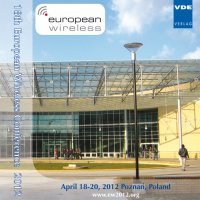Adaptive Modulation and Coding with Hybrid-ARQ for Latency-constrained Networks
Conference: European Wireless 2012 - 18th European Wireless Conference 2012
04/18/2012 - 04/20/2012 at Poznan, Poland
Proceedings: European Wireless 2012
Pages: 8Language: englishTyp: PDF
Authors:
Villa, Tania; Knopp, Raymond (Eurecom)
Merz, Ruben (Telekom Innovation Laboratories)
Takyar, Uday (EPFL, School of Computer and Communication Sciences)
Abstract:
Traffic generated by machine to machine (M2M) communication or online gaming will be a large and integral part of the traffic transported by LTE-advanced and beyond networks. This traffic is characterized by sporadic and low-throughput packet arrivals. It must be scheduled under a latency constraint. Sporadic traffic creates environments where the channel-quality information (CQI) is outdated or unavailable. Fast-fading, the non-stationarity of inter-cell interference and the heterogeneity of Rel-10 networks further exacerbates this issue. However, current LTE-Advanced schedulers and resource allocation schemes are not optimized for these particular scenarios. In this paper, we propose a scheduling and resource allocation mechanism for latency-constrained operation. Our solution significantly improves the spectral efficiency of delay-constrained networks by optimizing a joint hybrid-ARQ and adaptive modulation and coding (AMC) policy that changes the number of dimensions (physical resources) used in each round. With only one bit of feedback, obtained causally from hybrid-ARQ, we achieve a performance close to the ergodic capacity.


